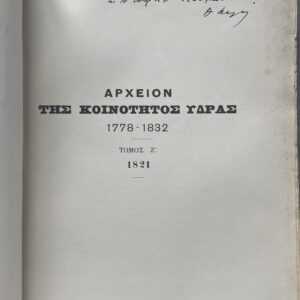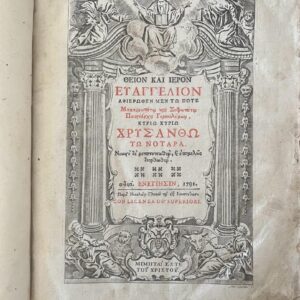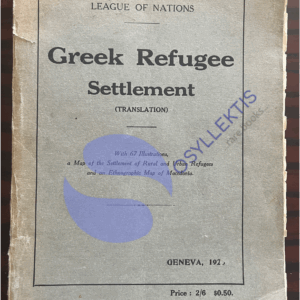Rare! 1805, Eugenios Voulgaris, TA ARESKONTA, First Edition, Vienna Printing, Greek Enlightment book
3,150.00€
The publication seems to have been made under the supervision of Stavros Ioannou and edited by Konstantinos Koumas.
The Zosimades or Zosimas brothers were 18th-19th century Greek benefactors and merchants. Ιn 1828 the Zosimades donated more than 293 copies of the book to the Hellenic Nation.
In 1832, the multiple copies of the book, which had been collected in a warehouse of the Orphanage of Aegina, were channeled, by decision of the Government, to the market (Aegina-Syros-Istanbul-Izmir-Nafplio), at a reasonable price.
The dissertation examines the process of appropriation of the 18th century natural philisophy by two prominent Greek speaking scholars and their attempts towards the construction of a new philosophy of nature. Eugenios Voulgaris (1716 – 1806) and Nikiforos Theotokis (1731 – 1800) were typical representatives of a new generationof scholars who interlinked the improvement of a new generation of scholars who interlinked the improvement of their own social status with the establishment of a new pholosophical trend in the Greek intellectual life. Their attempts , though, did not take place in vacuo. Both philosophers were agents of a well-established neoaristotelian philosophical tradition, which had formed the basis for a consistent interpretation of nature from the early 17th century. On the other hand, since they both wer active members of the Orthodox clergy they attempted to eliminate the dichotomy between philosophy and theology and to bring forth the idea tht natural order was a testimony of divine wisdom. In this sense, their involvement with natural philosophy employed both their social ambitions and their philosophical and theological commitments. The author studies the principles of natural philosophy and the theory of motion in the works of Voulgaris and Theotokis and describes the procedures through which the two scholars assimilated the new scientific ideas into their own intellectual milieu. The dissertation takes distances from the historiographic model according to which a universal science was “transformed” from the centre to periphery, and stresses the importance of local factors in the production of scientific discourse.
Description
ΕΥΓΕΝΙΟΣ ΒΟΥΛΓΑΡΗΣ
ΤΑ ΑΡΕΣΚΟΝΤΑ ΤΟΙΣ ΦΙΛΟΣΟΦΟΙΣ
Ta Areskonta tis Philosophis
ΗΤΟΙ ΤΑ ΠΕΡΙ ΤΩΝ ΦΥΣΕΙ ΟΝΤΩΝ ΦΙΛΟΣΟΦΟΥΜΕΝΑ
επιτετμημένως μεν, σαφώς δε ως οιόν τε εκ διαφόρων Φιλοσόφων αωτευθέντα
ΥΠΟ ΤΟΥ ΠΑΝΙΕΡΩΤΑΤΟΥ ΑΡΧΙΕΠΙΣΚΟΠΟΥ
ΚΥΡΙΟΥ ΕΥΓΕΝΙΟΥ ΤΟΥ ΒΟΥΛΓΑΡΕΩΣ
Ιεροδιακόνου έτι όντος, και σχολαρχούντος έντε Ιωαννίνοις,
και εν τη Αθωνιάδι Ακαδημία, και εν Κωνσταντινουπόλει, προς ακρόασιν των παρ’ αυτώ μαθητιόντων.
Τα νυν δε τύποις εκδοθέντα υπό της Αυταδελφότητος των
ΖΩΣΙΜΑΔΩΝ Α. και Ν. και Ζ. και Μ.
επί τω διανεμηθήναι δωρεάν τοις φιλεπιστήμοσιν Ελλήνων Νεανίσκοις.
Eugenios Voulgaris
What Philosophers Prefer – The Principles of Philosophers
Natural Philosophy
By His Holiness the Archbishop Eugenios Voulgaris
Cleric scholar in Ioannina and at the Athonite Academy, and in Constantinople
Published by the Zosimades A. and N. and Z. and M. and distributed to Greek Young Scholars
Printed in Vienna in 1805 by Georgios Vendotis in light blue colour paper
First Edition
Pages VI + 432 + 1 content + 20 Tables (complete!)
23cm x 18cm (approx. 9 inch. x 7,1inch.)
Eugenios Voulgaris or Boulgaris (Greek: Εὐγένιος Βούλγαρης; 1716–1806) was a Greek Orthodox cleric, author, educator, mathematician, astronomer, physicist, and philosopher. He wrote about every discipline: legal, historical, theological, grammatical, linguistic, astronomy, political, mathematics, archaeology, music, secularism, euthanasia, and the tides. He wrote speeches, poems, appeals to Catherine II for the liberation of Greece, and hundreds of letters. He edited valuable editions of Byzantine writers and classical books and translated many texts from Latin into French. He was one of the students of Methodios Anthrakites. He translated many important foreign language academic documents to Greek. He was bishop of Cherson (in Crimea). He was a leading contributor to the Modern Greek Enlightenment.
About the book:
This is one of Voulgaris’ most important books where he attempts to explain important developments in natural philosophy to a Greek audience. At the same time he tries to eliminate the dichotomy between philosophy and theology and to bring forth the idea that natural order is a testimony of divine wisdom.
Additional information
| Languages | Greek |
|---|
You may also like…
-

1819, Konstantinos M. Koumas, Synopsis Palaias Geografias, First Edition, Smyrna, Printed in Vienna, Johann Schnierer
450.00€ Add to cart -

1837, Vienna Printing, Georgios Zachariadis, Kanones ton Mathiton aforontes tin pros ta Thia Evlavian, Holy Trinity Greek Orthodox Church in Vienna
580.00€ Add to cart -

UNIQUE! 1836, Trieste, Funeral Speech for Konstantinos Koumas, Greek Orthodox Church of Saint Nicholas
280.00€ Add to cart -

1828, Neophytos Vamvas, Syntaktikon tis Archaias Ellinikis Glossis, Ancient Greek Language, CORFU Printing, First Edition
290.00€ Add to cart



















